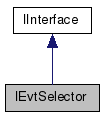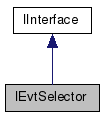 |
The Gaudi Framework
v29r0 (ff2e7097)
|
 |
The Gaudi Framework
v29r0 (ff2e7097)
|
The Event Selector Interface. More...
#include <GaudiKernel/IEvtSelector.h>


Classes | |
| class | Context |
Public Member Functions | |
| DeclareInterfaceID (IEvtSelector, 2, 0) | |
| InterfaceID. More... | |
| virtual StatusCode | createContext (Context *&c) const =0 |
| Create and return a context object that will keep track of the state of selection. More... | |
| virtual StatusCode | next (Context &c) const =0 |
| Fetch the next event or the first event if it will be use soon after the creation of the context. More... | |
| virtual StatusCode | next (Context &c, int jump) const =0 |
| Same of next(const Context&) plus the possibility to jump the next n-1 events. More... | |
| virtual StatusCode | previous (Context &c) const =0 |
| Fetch the previous event. More... | |
| virtual StatusCode | previous (Context &c, int jump) const =0 |
| Same of previous(Context& c) the possibility to jump the previous n-1 events. More... | |
| virtual StatusCode | last (Context &refContext) const =0 |
| Access last item in the iteration. More... | |
| virtual StatusCode | rewind (Context &c) const =0 |
| Will set the state of the context in a way that the next event read is the first of the list. More... | |
| virtual StatusCode | createAddress (const Context &c, IOpaqueAddress *&iop) const =0 |
| Create an IOpaqueAddress object from the event fetched. More... | |
| virtual StatusCode | releaseContext (Context *&) const =0 |
| Release the Context object. More... | |
| virtual StatusCode | resetCriteria (const std::string &cr, Context &c) const =0 |
| Will set a new criteria for the selection of the next list of events and will change the state of the context in a way to point to the new list. More... | |
 Public Member Functions inherited from IInterface Public Member Functions inherited from IInterface | |
| virtual void * | i_cast (const InterfaceID &) const =0 |
| main cast function More... | |
| virtual std::vector< std::string > | getInterfaceNames () const =0 |
| Returns a vector of strings containing the names of all the implemented interfaces. More... | |
| virtual unsigned long | addRef ()=0 |
| Increment the reference count of Interface instance. More... | |
| virtual unsigned long | release ()=0 |
| Release Interface instance. More... | |
| virtual unsigned long | refCount () const =0 |
| Current reference count. More... | |
| virtual StatusCode | queryInterface (const InterfaceID &ti, void **pp)=0 |
| Set the void** to the pointer to the requested interface of the instance. More... | |
| virtual | ~IInterface ()=default |
| Virtual destructor. More... | |
Additional Inherited Members | |
 Public Types inherited from IInterface Public Types inherited from IInterface | |
| enum | Status { SUCCESS = 1, NO_INTERFACE, VERSMISMATCH, LAST_ERROR } |
| Return status. More... | |
| using | iid = Gaudi::InterfaceId< IInterface, 0, 0 > |
| Interface ID. More... | |
| using | ext_iids = Gaudi::interface_list< iid > |
| Extra interfaces. More... | |
 Static Public Member Functions inherited from IInterface Static Public Member Functions inherited from IInterface | |
| static const InterfaceID & | interfaceID () |
| Return an instance of InterfaceID identifying the interface. More... | |
The Event Selector Interface.
The EventSelector component is able to produce a list of event given a set of stream specifications.
Definition at line 18 of file IEvtSelector.h.
|
pure virtual |
Create an IOpaqueAddress object from the event fetched.
| c | Reference to the Context object. |
| iop | Refernce pointer to a IOpaqueAddress object |
|
pure virtual |
Create and return a context object that will keep track of the state of selection.
| c | Reference of a pointer to a Context object. |
| IEvtSelector::DeclareInterfaceID | ( | IEvtSelector | , |
| 2 | , | ||
| 0 | |||
| ) |
|
pure virtual |
Access last item in the iteration.
| refContext | [IN/OUT] Reference to the Context object. |
|
pure virtual |
Fetch the next event or the first event if it will be use soon after the creation of the context.
It will return StatusCode::FAILURE if there have been problem in the fetching or it has been reached the end of the list of events.
| c | Reference to the Context object. |
|
pure virtual |
Same of next(const Context&) plus the possibility to jump the next n-1 events.
| c | Reference to the Context object. |
| jump | The event to jump to from the current event. |
|
pure virtual |
Fetch the previous event.
It will return StatusCode::FAILURE if there have been problem in the fetching or it has been reached the begin of the list of events.
| c | Reference to the Context object. |
|
pure virtual |
Same of previous(Context& c) the possibility to jump the previous n-1 events.
| c | Reference to the Context object. |
| jump | The event to jump to from the current event. |
|
pure virtual |
|
pure virtual |
Will set a new criteria for the selection of the next list of events and will change the state of the context in a way to point to the new list.
| cr | The new criteria string. |
| c | Reference pointer to the Context object. |
|
pure virtual |
Will set the state of the context in a way that the next event read is the first of the list.
| c | Reference to the Context object. |